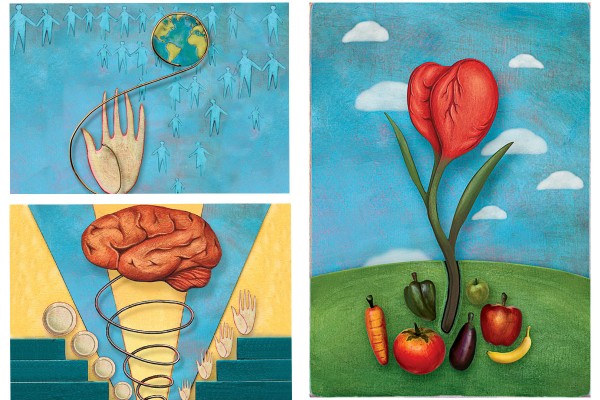Friends know how long you’ll live, study finds
Young lovers walking down the aisle may dream of long and healthy lives together, but close friends in the wedding party may have a better sense of whether those wishes will come true, suggests new research on personality and longevity from Washington University in St. Louis.
Genetic errors linked to aging underlie leukemia that develops after cancer treatment
New research by Daniel Link, MD, and colleagues at The Genome Institute at Washington University has revealed that mutations that accumulate randomly as a person ages can play a role in a fatal form of leukemia that develops after treatment for another cancer.
Strategy proposed for preventing diseases of aging
More efforts should be directed at promoting interventions that have the potential to prevent multiple chronic diseases and extend healthy lifespans. School of Medicine and other researchers write in Nature that economic incentives in biomedical research and health care reward treating disease more than promoting good health.
Mouse study offers new clues to cognitive decline
New research suggests that certain types of brain cells may be “picky eaters,” seeming to prefer one specific energy source
over others. The finding has implications for understanding the cognitive decline seen in aging and degenerative diseases such as Alzheimer’s and multiple sclerosis.
The longevity revolution
Today, two-thirds of those ever reaching the age of 65 are on the planet. Further, university researchers may have the keys to help people live even longer, healthier and more productive lives — but is society ready?
Exploring health benefits of fasting two days a week
Researchers at Washington University School of Medicine in St. Louis are studying whether fasting from food a few days a week provides some of the same health benefits as severely limiting calories every day of the week.
Aging really is ‘in your head’
Researchers have identified the mechanism by which a specific sirtuin protein called Sirt1 (shown in green) operates in the brain to bring about a significant delay in aging and an increase in longevity.
Friedman Center hosts Global Aging Initiative in South Korea
Chancellor Mark S. Wrighton welcomed more than 60 scholars from around the world — including Washington University in St. Louis and representatives from the McDonnell International Scholars Academy partner institutions — to Seoul, South Korea, in June for the Global Aging Initiative. The meeting, sponsored by the Harvey A. Friedman Center for Aging at WUSTL’s Institute for Public Health, was the first opportunity for scholars to connect and identify opportunities for collaboration on cross-national aging-related research.
Older adult clumsiness linked to brain changes
For many older adults, the aging process seems to go hand-in-hand with an annoying increase in clumsiness. New research from Washington University in St. Louis suggests some of these reaching-and-grabbing difficulties may be caused by changes in the mental frame of reference that older adults use to visualize nearby objects.
Andrew Scharlach to discuss aging-friendly communities at Friedman lecture
Andrew Scharlach, PhD, the Eugene and Rose Kleiner Professor of Aging at the University of California, Berkeley, will deliver the 2013 Friedman lecture May 3 at the Eric P. Newman Education Center on the Washington University School of Medicine campus. The title of his lecture is “Creating Aging-Friendly Communities.”
View More Stories


